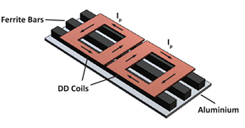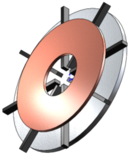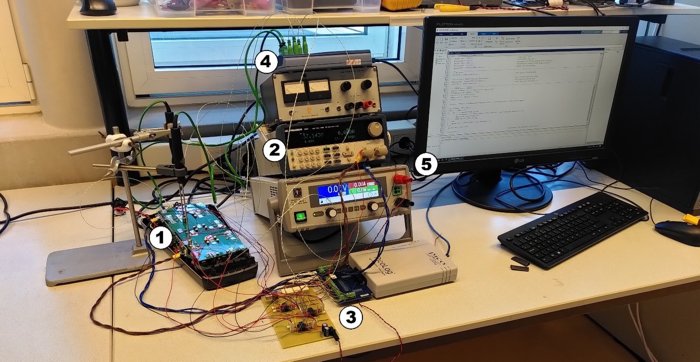Power Electronics for Battery and EV Charging Systems
I am Prasanth Venugopal and I work as a Research Assistant Professor in the group of Power Electronics and EMC (PE group), within the Department of Electrical Engineering, Mathematics and Computer Science (EEMCS). My current research is focused on battery charging systems for a successful sustainable energy transition.
Background
I completed my B. Tech (2010, silver medal) in India, followed by MSc. (2012, cum laude) and a PhD (2018), both at TU Delft. My MSc. thesis was awarded a UFD Cofely Energy Efficiency Prize at TU Delft and my PhD thesis won an IEEE IAS second-best thesis prize.
During my PhD at TU Delft, I worked on performing analyses, simulations and building a wireless charging system with inductive power transfer for light electric vehicles. This resulted in modelling and mitigating power limiting problems related to misalignment in IPT systems by proposing advanced magnetic designs, including segmented couplings. Furthermore, I analysed the systems for a distributed IPT system based on reduced ferrite for charging EVs travelling along a highway. The research included near-field EM-based partial inductance exploits, detailed FEM analysis and development of the final working prototype. I then applied my expertise in modelling and building magnetic systems to a self-healing highway concept that integrates steel with concrete. Since magnetic fields can now be shaped to perform both energy transfer and self-healing, I investigated their combination and interactions. Finally, I researched a visionary future highway that integrates renewable energy technologies, wireless charging for EVs, and also self-healing roads.
As an assistant professor, I am currently conducting research and establishing a new research program for battery electronics, including the laboratory for it. The goal is to create a laboratory that transcends research verticals of measurements: from cells, through modules, to the battery pack. Advanced battery management systems and life-cycle measurements will give us an edge in the form of well-defined measurements of battery parameters and their states, and to further extend the life of battery packs. This could save millions to billions of euros, especially for EVs. Advanced power electronics and precise measurements are key here, and we want to lead the way in Europe.



Figure 1 Segmented DD coupler, circular coupler and impact of misalignment on different couplers.

Figure 2 Measurement setup - 1: Battery pack, 2: Programmable load, 3: Voltage logger + differential probes, 4: Temperature logger and 5: Post-processing digitally.
In the years to come
Future battery systems require a totally different approach to incorporating reliability, optimum performance and long life. Batteries are increasingly being used in the automotive industry, in grid-level energy storage and in stable markets for electronic applications, among others. Batteries and advanced battery management systems are therefore becoming incredibly important. In addition to lithium-ion batteries, new applications such as redox-flow batteries and sodium-ion batteries will emerge in the next decade. Such an integrated intelligent battery pack/system will make it possible in the future to make accurate measurements of battery parameters (voltage, current, impedance, temperature, etc.), accurately estimate battery status and also provide accurate diagnostic and prognostic data. The data analysis enabled within the battery ensures that the battery is working optimally and can also record its utility within a battery passport, making echelon use or second-life applications feasible. For example, automotive batteries in grid-scale energy storage use. Battery research is an important part of the sustainable energy transition. Therefore, in the future, we will see several innovative green batteries used in different energy storage systems.

Figure 2 Future Battery Systems that perform diagnostics and prognostics to maintain a safe, reliable and long life battery pack.
Education
In addition to research, I teach the Power Electronics MSc. course: Electrical Machines and Drives. In this course, students learn about applications of Maxwell's equation within magnetic systems with a specific focus on electromechanical systems. Additionally, I teach the PE MSc. course: Power Electronic Systems. In this course, I bridge the gap between theoretical treatment and applied industrial problems. In addition, I am also a tutor for the Power Electronics Project for undergraduate students and teach within the Electricity module of the new Energy Transition Minor. Finally, I also regularly supervise BSc., MSc. and PhD students during their final projects.
Collaborations
For our research, we work strongly together with Van Raam, Brekr, Twinx, Contour, DNV GL and Twente Safety Campus. We are also closely involved in the STEPS project (interreg NW Europe), where we support several battery startups with a strong consortium of knowledge institutes, such as U Gent, Faraday Institution, TU Darmstadt and NU Ireland. In addition, we collaborate with several national measurement institutes, including VSL (NL), NPL (UK) and PTB (DE) for future projects on battery measurements.

